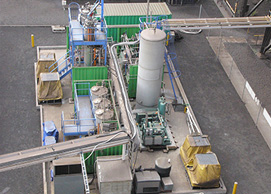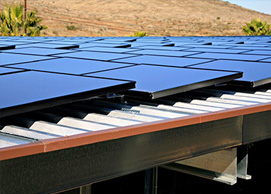GLOBAL STEEL EFFORT TO IMPROVE THE ENVIRONMENT
 Improving the world steel industry's greenhouse gas intensity is a huge challenge and requires a global effort. BlueScope Steel, in partnership with other steel makers and the World Steel Association (worldsteel), is committed to continued participation in the worldsteel CO2 emissions data collection program, and is contributing to worldwide data collection and research efforts.
Improving the world steel industry's greenhouse gas intensity is a huge challenge and requires a global effort. BlueScope Steel, in partnership with other steel makers and the World Steel Association (worldsteel), is committed to continued participation in the worldsteel CO2 emissions data collection program, and is contributing to worldwide data collection and research efforts.
BREAKTHOUGH RESEARCH
 The Company has been engaged in research under the worldsteel CO2 Breakthrough Programme. In collaboration with Australian steelmaker Arrium and the Australian Commonwealth Scientific and Industrial Research Organisation(CSIRO), the research project focuses on the potential to use biomass as a substitute for a proportion of the coal or natural gas used in the iron and steelmaking process.
The Company has been engaged in research under the worldsteel CO2 Breakthrough Programme. In collaboration with Australian steelmaker Arrium and the Australian Commonwealth Scientific and Industrial Research Organisation(CSIRO), the research project focuses on the potential to use biomass as a substitute for a proportion of the coal or natural gas used in the iron and steelmaking process.
Since 2008, Auckland based biofuel pioneer LanzaTech has operated a pilot plant at New Zealand Steel to produce ethanol from waste gases produced by the steelmaking process. In March 2012, BlueScope and LanzaTech signed a new agreement extending this arrangement and giving BlueScope and New Zealand Steel the opportunity to use LanzaTech's technology commercially. The agreement reflects both BlueScope's commitment to supporting innovative solutions for sustainable growth, and LanzaTech's move from technology development to commercialisation. Building on the support provided by BlueScope, LanzaTech has announced a series of agreements with steelmakers around the world to use its innovative technology.
ENERGY EFFICIENCY
Optimising Coke Ovens Heating Model
In a coke oven, coal is heated in the absence of oxygen to a temperature of between 1200oC and 1300oC for approximately 18 hours. Impurities such as hydrogen, sulphur, nitrogen, and oxygen are driven off, leaving almost pure carbon known as coke which is used to reduce iron ore in a blast furnace.
An automated system now controls the heating of the oven to achieve the correct properties for coke, saving 89,300 GJ/annum of energy. This has been achieved by optimising the control system to heat the ovens more efficiently.
 Going Green with Solar Power
Going Green with Solar Power
ASC Profiles in Sacramento has taken on the challenge to reduce its impact on the environment by forming a partnership with a solar power panel manufacturer to use photovoltaic (PV) technology to generate electricity. Under the partnership, ASC Profiles provides property and infrastructure to house the PV solar panels which will supply the site with renewable electricity. The roof and ground mount PV system will generate 300.96kWDC, and will be connected with the utility grid. ASC Profiles will use the electricity generated by the panels, thus saving on energy costs. Excess power will be sold back to the power grid, to the benefit of the solar panel manufacturer. The deal is a win-win situation for both companies.
This initiative will not only help the environment, it will showcase solar panels for other businesses that use ASC Profiles structural frame work. This is a great example of how ASC Profiles is an innovative company leading the way in improving the environment for the future.
